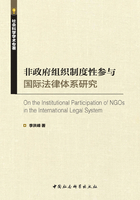
四 研究的路径及研究方法
(一)研究路径
本书的研究路径遵循提出问题—分析问题—解决问题的逻辑进行展开。本书首先在论述非政府组织已经成为国际法的重要参与者后,提出了非政府组织制度性参与国际法律体系的概念以及非政府组织当前在国际法进程中的参与制度安排如何以及是否有效等问题。然后,本书针对提出的问题,重点对非政府组织制度性参与国际立法、国际法的监督执行和国际司法诉讼程序中的参与制度安排和实践进行梳理和分析,并指出其中存在的问题。最后,本书在对非政府组织制度性进一步参与国际法律体系的空间进行评估后,提出了发展和完善当前非政府组织参与国际法进程的制度安排建议。
(二)研究方法
本书主要采用了以下几种研究方法。
1.实证研究的方法。法律的生命在于实践和经验,实证研究的方法贯穿于本书研究的始终。为了论述非政府组织是国际法律体系的重要参与者,除了进行必要的理论分析外,最直接和有力的论证就是通过非政府组织参与国际法进程的实证来进行分析阐述。此外,本书在论述非政府组织参与国际法律体系的制度发展进程,非政府组织制度性参与国际立法、国际法监督执行和国际司法诉讼程序的实践效果等都使用了实证分析的方法。
2.比较分析的方法。比较分析的方法是本书研究中使用的又一重要方法。例如,在对非政府组织在国际组织、国际会议、国际条约机构、国际司法和准司法机构中的不同制度安排进行了详细的梳理,并对相关的制度安排进行了比较分析。此外,在评估非政府组织进一步制度性参与国际法实践的空间时,对相关制度性参与的不同观点以及不同国际组织对待非政府组织制度性参与的不同态度进行了比较分析。
3.历史研究的方法。本书在考察非政府组织制度性参与国际法实践的制度发展时,使用了历史研究的方法。事实上,对非政府组织在一国际组织或司法机构中的参与制度发展状况的纵向考察也是历史研究的方法。
4.条约解读的方法。这是本书使用最多的研究方法。在本书分析非政府组织参与国际立法、国际法监督执行和国际司法诉讼进程中制度安排时,主要就是对相关的条约、公约、决议、章程等法律文件进行解读、梳理和分析。通过对条约文本的解读,明确非政府组织参与国际法实践制度安排现状,发现其中的不足与存在的问题,有助于针对性提出发展和完善的建议。
[1]See the Report of the Panel of Eminent Persons on United Nations-Civil Society Relations(the Cardoso Report),A/58/817 of June 11,2004,available at http://www.un-ngls.org/Final% 20report% 20-% 20 HLP.doc.,last visited on May 23,2008.
[2]See The Future of the WTO:Addressing Institutional Challenges in the New Millennium,Report by the Consultative Board to the Former Director-General Supachai Panitchpakdi,available at http://www.ipu.org/splz-e/wto-symp05/future_WTO.pdf.,last visited on May 23,2008.
[3]Anton Vedder,NGOs Involvement in International Governance and Policy:Sourceso f Legitimacy,Leiden:Martinus Nijhoff Publishers,2007,p.1.
[4]胡加祥:《当代国际法的先驱——拉萨·奥本海》,载徐冬根主编《跨国法评论》,北京大学出版社2004年版,第291页。
[5]黄世席:《非政府间国际组织的国际法主体资格探讨》,《当代法学》2000年第5期,第69—71页。
[6]彭忠波:《非政府国际组织的法律人格探析》,《武大国际法评论》2007年第1期,第128—144页。
[7]王世红:《非政府组织的法律地位考察》,《河南师范大学学报》2007年第2期,第57—60页。
[8]孙海燕:《国际非政府组织国际法律地位的国际造法尝试评析》,《贵州大学学报》(社会科学版)2008年第4期,第44—49页。
[9]李俊义:《非政府间国际组织的国际法律地位研究》,博士学位论文,华东政法大学,2010年。
[10]鄂晓梅:《国际非政府组织对国际法的影响》,《政法论坛》2001年第3期,第122—126页。
[11]黄志雄:《非政府组织:国际法律秩序中的第三种力量》,《法学研究》2003年第4期,第122—131页。
[12]刘超:《非政府组织的勃兴与国际法律秩序的变塑》,《现代法学》2004年第4期,第102—108页。
[13]何顺善:《论国际组织对国际法的影响》,《政治与法律》2008年第3期,第95—100页。
[14]黄志雄主编:《国际法视角下的非政府组织——趋势、影响与回应》,中国政法大学出版社2012年版。
[15]蔡从燕:《私人结构性参与多边贸易体制》,北京大学出版社2007年版。
[16]孙海燕:《从国际法视角看联合国与非政府组织的制度化联系》,《北京大学学报》(哲学社会科学版)2008年第4期,第138—143页。
[17]徐昕:《非政府组织制度性参与WTO事务研究》,同济大学出版社2011年版。
[18]See W.P.Heere(ed.),From Government to Governance:The Growing Impact of Non-State Actors on the International and European Legal System,Hague:TMC Asser Press,2004.
[19]See Anna-Karin Lindblom,Non-Governmental Organizations in International Law,Cambridge:Cambridge University Press,2005.
[20]See Pierre-Marie Dupuy &Luisa Vierucci(eds.),NGOs in International Law:Efficiency in Flexibility?,Cheltenham:Edward Elgar Publishing,2008.
[21]See Rephael Harel Ben-Ari,The Normative Position of International Non-Governmental Organizations Under International Law,Leiden:Martinus Nijhoff Publishers,2012;Ingrid Rossi,Legal Status of Non-governmental Organizations in International Law,Antwerp:Intersentia,2010;Kate Parlet,The Individual in the International Legal System:Continuity and Change in International Law,Cambridge:Cambridge University Press,2011.
[22]See Anton Vedder(ed.),NGOs Involvement in International Governance and Policy:Sources of Legitimacy,Leiden:Martinus Nijhoff Publishers,2007;Sergey Ripinsky,and Peter Van den Bossche,NGOs Involvement in International Organizations:A Legal Analyses,London:British Institute of International and Comparative Law,2007.
[23]See Barbara K.Woodward,Global Civil Society in International Lawmaking and Global Governance:Theory and Practice,Leiden:Martinus Nijhoff Publishers,2010;Jean d'Aspremont(ed.),Participants in the International Legal System:Multiple Perspectives on Non-State Actors in International Law,Abingdon:Routledge,2011.
[24]See Kerstin Martens,Examining the Status of NGOs in International Law,Indiana Journal of Global Legal Status Studies,Vol.10,2003.
[25]See Marie Tornquist-Chesnier,NGOs and International Law,Journal of Human Rights,Vol.3,2004.
[26]See Steve Charnovitz,Non-Governmental Organizations and International Law,A-merican Journal of International Law,Vol.100,2006.
[27]See Sarah C.Schreck,The Role of Nongovernmental Organizations in International Environmental Law,Gonz.J.Int'l.L.,Vol.10,2006;Peter J.Spiro,NGOs in International Environmental Lawmaking:Theoretical Models,Social Science Research Network Electronic Paper Collection,No.26,2006.
[28]See Janet E.Lord,NGO Participation in Human Rights Law and Process:Latest Developments in the Effort to Develop an International Treaty on the Rights of Peoples with Disabilities,ILSA J Int'l &Comp L.,Vol.10,2004;Chandler H.Udo,Non-governmental Organizations and African Governments:Seeking an Effective International Legal Framework in a New Era of Heath and Development Aid,B.C.Int'l &Comp.L.Rev.,Vol.31,2008.
[29]See August Reinisch &Christina Irgel,The Participation of Non-Governmental Organisations(NGOs)in the WTO Dispute Settlement System,Non-State Actors and International Law,Vol.1,No.2,2001;Zoe Pearson,Non-Governmental Organizations and the International Criminal Court:Changing Landscapes of International Law,Cornell Int'l L.J.,Vol.39,2006.
[30]See Jeffrey Andrew Hartwick,Non-Governmental Organizations at United Nations-Sponsored World Conferences:A Framework for.Participation,Loy.L.A.Int'l &Comp.L.Rev.,Vol.26,2003.
[31]See Erik B.Bluemel,Overcoming NGO Accountability Concerns in International Governance,Brook.J.Int'l L.,Vol.31,2005.
[32]See Emanuele Rebasti,A Legal Status for NGOs in Contemporary International Law?,Eur.Univ.Inst.Work-shop Report,Nov.2002,available at http://users.unimi.it/sociv/documenti/report.doc.,last visited on April 21,2013.
[33]See Ingrid Rossi,NGOs in International Law:Has Regulation Come to a Halt?,Working Paper of Institute for International Law,No.123-February,2008,avialble at http://w ww.law.kuleuven.be/iir/nl/onderzoek/wp/WP123e.pdf.,last visited on April 21,2013.